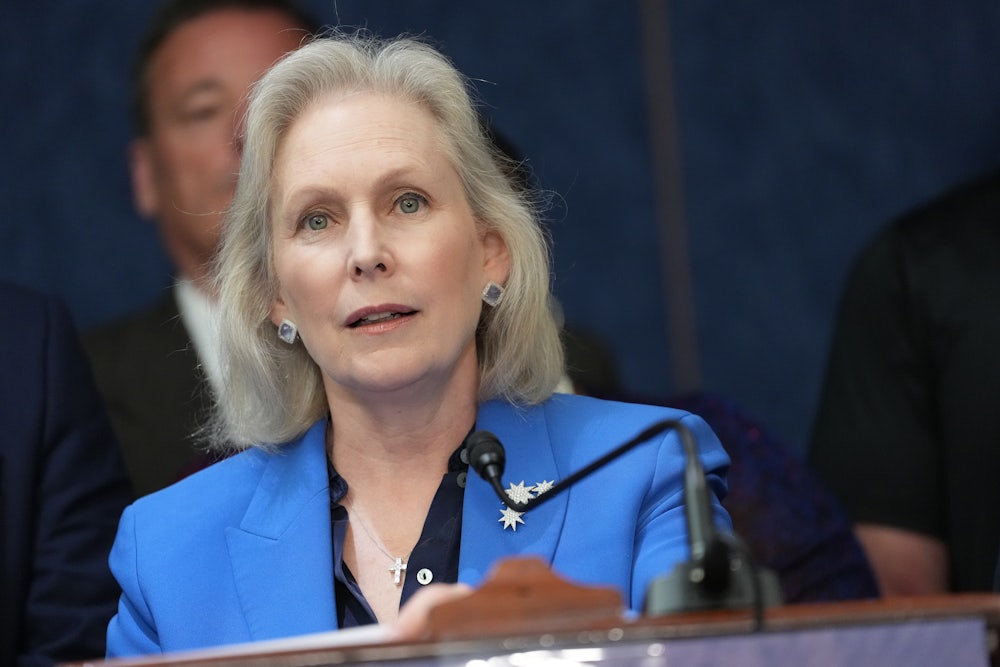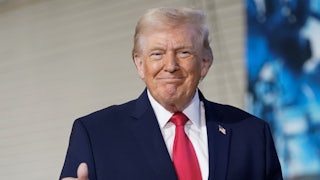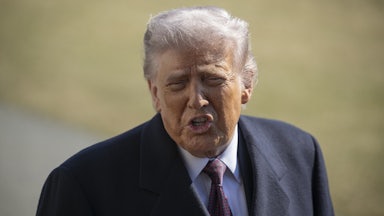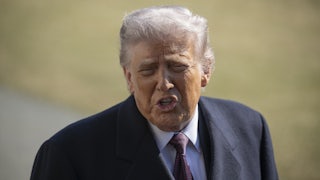Recently, Semafor’s Ben Smith reported a gossipy exposé on the rapidly dwindling number of tech oligarchs and talking heads who want to spend any time online with Marc Andreessen and David Sacks. According to Smith, Andreessen—the onetime CEO of Netscape, now a cryptocurrency and artificial intelligence investor—maintained a slew of hyper-exclusive Signal group chats for years, in which business and media elites vented about liberals on social media and generally talked politics.
“Marc radicalized over time,” the writer Richard Hanania, a literal former neo-Nazi, told Smith. Similarly, Sacks apparently stormed out of the last iteration of the chats a few months ago, accusing “the loudest voices” of “TDS,” an abbreviation for “Trump Derangement Syndrome.”
This reflects the broader politics of cryptocurrency, in which both men are invested: The crypto lobby spent dark money in the 2024 elections in a league completely unto itself, and overwhelmingly for the Republican Party. It is difficult to imagine that Republicans would enjoy their current trifecta, fueling the possible collapse of the American republic, if it weren’t for crypto.
But Democrats would not be Democrats if it wasn’t for their ability to take a punch in the mouth … and mumble gratitude for the timely wake-up call.
Because it appears that despite the cryptocurrency industry’s support for the Republican Party … and despite the Trump family’s brazen embrace of cryptocurrency, Senate Democrats are probably set to provide the critical votes necessary to pass the so-called GENIUS Act sometime before Memorial Day. The GENIUS Act is a very soft touch “regulatory framework” to entrench the so-called “stablecoins” (including one associated with the Trump family) that grease the wheels of cryptocurrency speculation. Some Democrats pushed for language aimed at the Trump family’s crypto profits, but it doesn’t look like that’s going to be in there.
And so the Andreessen, Sacks, and cryptocurrency-wide bet that they can attack Democrats (and arguably democracy), confident that they won’t do much in response, seems to be paying off. They should be stoked!
Despite being literal billionaires, who all but dictate American economic policy, Andreessen and Sacks still seem to feel disrespected. Andreessen’s bizarre “Techno-Optimist Manifesto” and Sacks’s self-congratulating podcast All In both echo these men’s frustration that the media adulation they took for granted in the 1990s and the 2000s is gone; people, you know, criticize them now. It’s not like it used to be, and dammit, it ought to go back!
This is a childish attitude for anyone. But it’s especially bizarre to see from Silicon Valley venture capitalists, who not so very long ago had an ugly and extremely public display of their own business incompetence.
Those outside of crypto spaces might have first encountered Sacks two years ago as the de facto face of the bailout of Silicon Valley Bank.
This March was the two-year anniversary of the collapse of SVB, the go-to financier for Sacks, Andreessen, and the beloved private start-ups of them and many other venture capitalists. The SVB failure threatened to entirely wipe out these men’s investments due to their own failure to account for deposit insurance restrictions known to most members of the general public.
Democrats would have been well within their rights to let the moguls suffer the consequences of their actions. If they really hated the start-up economy as much as is claimed—or had the zeal against corporate greed and corruption that progressive populists urged—then the SVB failure gave them the perfect opportunity to wipe it off the map without lifting a finger.
Instead, the Democratic president and treasury secretary bent over backward to skirt long-standing rules and do everything it took to save SVB’s depositors. Two of the biggest beneficiaries of that kindness were Sacks and Andreessen. And instead of appreciation, these tech bros without an understanding of Federal Deposit Insurance Corporation insurance backed Trump and ascendant congressional Republicans while proclaiming Democrats insufficiently solicitous of their business acumen.
On the second anniversary of the SVB bailout, let’s remember that it isn’t Democrats who abandoned tech. It’s the tech moguls who abandoned the social contract—not just with the Democratic Party, but with anyone who isn’t them.
Silicon Valley Bank was exactly what the name implies. Founded in 1983, it was the go-to financial partner for tech start-ups that needed loans, payroll services, and so on. It also lent heavily to the people behind the firms, providing mortgages and personal credit lines to “founders” building their California mansions.
SVB banked half of the venture capital–backed “start-up” business ecosystem. In late 2022, serving this particular niche had made it the sixteenth-largest bank in America. As the tech industry enjoyed a pandemic-induced windfall—everyone was stuck inside with nothing to do but play on their phones for a year—SVB’s year-over-year deposits doubled from $62 billion to $124 billion by March 2021, enough to put the bank in the S&P 500.
But with greater deposits comes greater risk. SVB took greater risks, but it did not couple that with greater risk management. While ignoring six separate warnings from the Federal Reserve, it continued investing in low-yield, long-dated bonds, essentially assuming interest rates would stay near zero despite the end of Covid-19 lockdown. This was a bad bet. The Fed jacked up rates in early 2023 in response to inflation (possibly wrong—but a quite mainstream response), sharply diminishing the value of SVB’s bond portfolio. Meanwhile, those same high interest rates meant a lot of tech start-ups couldn’t get attractive loans elsewhere, so they started to tap their SVB deposit accounts for short-term cash. With only those worthless long-dated bonds to sell, SVB found itself in a crunch.
A classic bank run ensued. Companies raced to liquidate their SVB accounts before the bank ran out of money. On the morning of March 10, the California Department of Financial Protection and Innovation seized SVB in the largest bank failure since the 2008 financial crisis.
This posed an existential threat to the start-up economy. An estimated 89 percent of deposits at the bank exceeded the FDIC limit of $250,000, meaning they were not insured by the federal government and stood to be wiped out in the receivership. That meant a large number of venture-backed companies’ liquid wealth would be eradicated; they’d be unable to make payroll, pay rent and utilities, and generally keep their basic operations going.
One such company was Circle, maker of the stablecoin USDC. It stored $3.3 billion at SVB, around 8 percent of its total assets. The entire purpose of a stablecoin is its promise that for each crypto token issued, the issuing company has an old-fashioned U.S. dollar at the ready to swap out to the token’s owner whenever they ask. Think of it like a checking account denominated in a different, private currency, but which promises that this currency is one-to-one convertible into dollars, the same way the numbers on your bank statement are convertible into cash. But unlike checking accounts, stablecoins don’t have a government backstop; USDC is only backed by Circle’s word. Letting SVB falter potentially could have “broken the buck” for Circle, meaning it would not be able to guarantee one-to-one convertibility between USDC and U.S. dollars. The likely ensuing panic could have undermined much of the rest of the crypto ecosystem, to which USDC is a gateway.
So what did the venture capitalists who’d sent their portfolio firms to SVB in the first place do?
Demand an exception to the rules, of course. “Where is Powell? Where is Yellen? Stop this crisis NOW,” Sacks tweeted indignantly, insisting that the government “announce that all depositors will be safe.” “@POTUS & @SecYellen MUST GET ON TV TOMORROW AND GUARANTEE ALL DEPOSITS UP TO $10M OR THIS WILL SPIRAL INTO CHAOS,” tweeted fellow V.C.-er Jason Calacanis. Andreessen made personal calls to hedge funds and other banks, looking for a buyer, as Silicon Valley Congressmen Ro Khanna and Eric Swalwell started lobbying the president for help. In a crisis of their own making, ignoring risks known to every consumer who’s read the FDIC placard at their local bank, the venture capitalists demanded that the eat-or-be-eaten laws of capitalism never apply to them.
Let’s be clear: There are very fair policy arguments for eliminating the $250,000 insurance cap and fully guaranteeing all deposits in American banks. Doing so would help insulate the rest of the economy from any chaos in the financial sector, because it would effectively nationalize credit laundering and accounts-based money, two of the core functions of the banking system. It’s a fairly popular idea, and absolutely anathema to the libertarian ideals men like Sacks, Calacanis, and Andreessen swear by.
So, unsurprisingly, it is not what they were proposing. This was not a call to enact legislation or rethink banking rules. It was a call to make sure the rules as written don’t apply to their sector in particular, because they were foolish enough to put all of the eggs in one poorly run basket and were now suffering the consequences. It was a call for a bailout.
And that’s precisely what the Biden administration did. Seeing how SVB’s implosion was spreading panic at other tech-linked financial institutions (panic that Sacks’s and Calacanis’s tweets were fueling), Biden and Treasury Secretary Janet Yellen tapped the FDIC’s “systemic risk exception” to have the FDIC fully ensure SVB depositors. The panic calmed, the start-ups got their funds, and one year later, Sacks was calling Biden “a puppet” for moneyed interests out to loot the republic.
Sacks was not entirely wrong to accuse the Democratic Party of capture by big money. The problem is that the big money is him, his friends, and his portfolio companies.
Bringing up SVB raises the question of whether Biden was right to bail out the depositors. It’s debatable. Saving workaday coders’ jobs from their bosses’ poor decisions, and preventing a wider regional banking crisis, certainly might have been worth the moral hazard of further weakening the credibility of the deposit insurance cap.
On the other hand, everyone in finance will always think they’ll get a bailout until the first person doesn’t. If someone has to be the first, it’s hard to think of a better contender than crypto scammers, whose entire product is premised on dodging the rules in the first place. Letting bad actors face the consequences of their decisions before they become systemically significant is how financial stability is supposed to work.
If there had to be a bailout, it should have prompted an honest reckoning with that policy and an effort to fully ensure the banking system, in turn prompting a broader conversation about the point of private banks in the twenty-first century. But that’s a failing of Congress, not the Biden administration. (Albeit a quite predictable failing.)
What all Democrats, including the Biden White House, should think about is their broader failure to hold crypto, AI, banks, and other irresponsible elite actors to account after saving them from their own mistakes. Sacks should not be able to credibly cosplay as a populist rabble-rouser after shrieking for a special dispensation from the very financial authorities his portfolio firms claim to be bringing down.
If Biden hadn’t helped the depositors at SVB and Signature Bank—which catered even more to cryptocurrency and collapsed shortly afterward—many of the tokens Trump appointees are now welding onto the broader financial system likely wouldn’t exist. Moreover, there’d be more Democrats in Congress, most notably Sherrod Brown, the hard-charging former Democratic chair of the Senate Banking Committee who faced an onslaught of dark crypto money in his last reelection bid. Sacks doesn’t get to berate Democrats as “a collection of interests who want to loot the republic” when he and his peers are actively looting the republic right now.
This speaks to a broader neurosis in the Democratic Party that is a not-insignificant reason for its current lack of power. When greedy and foolish businessmen cause a potential economic crisis, it is fair and noble to prioritize the interests of workers and the broader economy over the cold discipline of the market. But discipline must still come to those businessmen in some other fashion, or they will never, never learn.
It’s not just the moral thing to do, it’s the politically salient thing to do. The best way to defang accusations of cronyism is to make them look ridiculous by cultivating a reputation for afflicting the powerful. Imagine a world where that crypto bro never meandered to Sacks in the first place, because his material needs and well-earned frustration were adequately addressed after 2008. Now imagine how that leaves a world where Sacks and his crypto army are unable to finance a 50-state strategy to knock their Democratic skeptics out of Congress.
If the Republican Party really does pose an existential threat to the American system of government, and there is no question that it does, then Democrats are decades past the point where they need to wake up and realize that they are not engaged in a sophomoric debate club or a sports league. They are in a war. To win a war, one must cut off the enemy’s supply chain. In U.S. politics, that means cutting off the dark money that fuels a partisan ecosystem—and the largest source of that dark money on the GOP side is now cryptocurrency.
Grifters, opportunists, and self-obsessed capitalists will never have a stable relationship with the Democratic Party. Unions, environmentalists, and civil rights leaders do; they know that the opposition will never welcome them, and they don’t want to be welcome in its circles anyway. As we endure an administration of Sackses and Trumps, a presidency that is definitionally one massive scam, it is up to the Democrats to finally decide what extraction, manipulation, and cruelty is intolerable.






